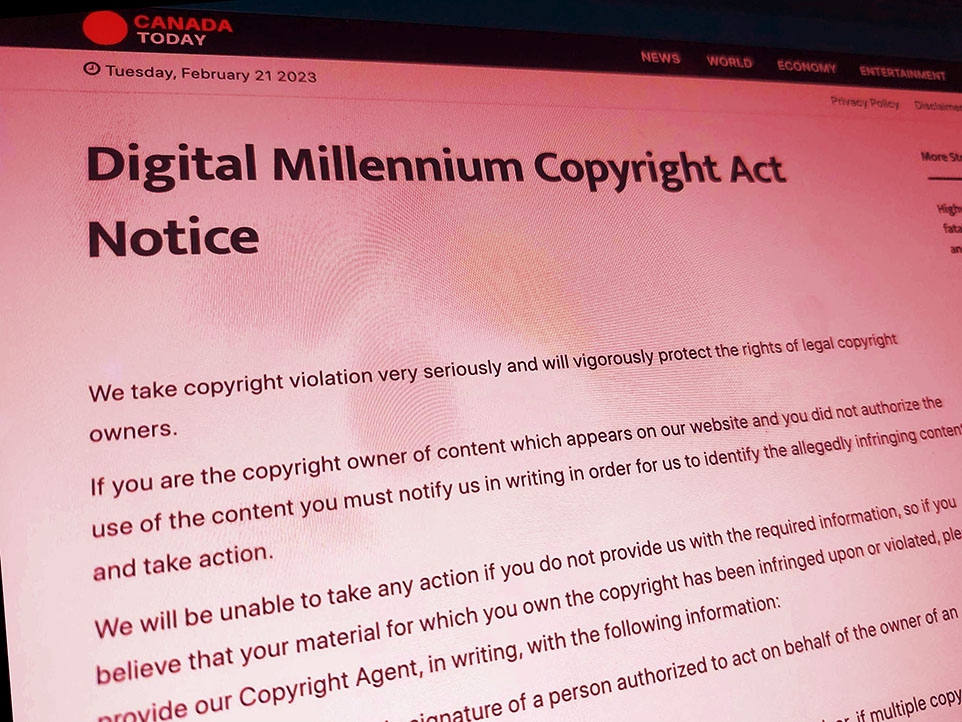Sites are stealing work from hard working journalists every day

Screenshot of canadatoday.news, photo by Sie Douglas-Fish.
If you are reading this article in the Martlet newspaper or on martlet.ca, then congratulations, you are consuming properly accredited journalism.
But, if you are reading this on a news site with an overly generic name and it says it was written by anyone other than Atum Beckett, then what you are reading is plagiarism.
It is a weird feeling to see things that you and your coworkers have written reposted online under unrecognizable names. That is exactly what is happening to the Martlet and countless other news publications.
Canadatoday.news must be the most prevalent news website that you’ve never heard of. It posts hundreds — yes, literally hundreds — of articles per day, covering every topic you could ever think of.
How does the website create so much content? The short answer is, it doesn’t. This business model relies on posting as much content as possible, farming clicks, and raking in ad-revenue.
Canada Today and many other websites like it repost articles from the internet, stealing credit from the hard working journalists who actually wrote them.
If you look up the so-called “authors” of these stolen articles, it’s no surprise that none of them seem to exist. Even the generic wording used in the name “Canada Today News” makes it nearly impossible to find any additional information about the website online.
The algorithms that steal and repost these articles make slight tweaks to them, usually substituting words with synonyms. This attempt at avoiding plagiarism detectors results in some truly terrible writing at times.
Luckily, Canada Today has a very reasonable copyright policy, which reads: “If you are the copyright owner of content which appears on our website and you did not authorize the use of the content you must notify us in writing in order for us to identify the allegedly infringing content and take action.”
Unfortunately, this notice was probably ripped from another website just like the rest of its content, because every effort that the Martlet has made to contact this website and get our stolen articles taken down has proved unfruitful. While Canada Today may not put a lot of effort into quality control, they have no problem being as elusive as possible.
Google’s service for reporting stolen content has also been unhelpful, and it seems that nothing can be done about sites like this with anything short of a full-on legal battle.
The Martlet isn’t the only local publication to have its content stolen by this specific site. Both The Tyee and Victoria Buzz have been victims of its cheap plagiarism.
“What we’re seeing here is that there’s very little you can do if some shadowy organization that never answers its emails and has no accountability, just scrapes your work,” says David Beers, founder of the Vancouver-based independent news site The Tyee.
Without a full team of lawyers behind you, it’s near impossible to take action against having your work stolen online, no matter what you’re creating. And with artificial intelligence systems scouring every corner of the web, who knows how much someone else is profiting off of work that you have created?
“In some ways, the case of Canada Today is a harbinger of probably where a lot of people would like to take the internet,” says Beers. “Which is to become a mass miner and exploiter of pretty much everyone’s labor.”
Stolen, unaccredited work is part of a much larger battle facing journalism as a whole: the rise of misinformation and the decrease of news reliability. With “fake news” being prevalent everywhere you look online, it’s no wonder why Canadians’ trust in news media has been declining.
“Traditional journalism is a huge inconvenience to the new digital robber barons, the Elon Musks and the Zuckerbergs,” says Beers. “It holds them accountable. They don’t want to be held accountable.”
At the end of last year, Facebook’s parent company, Meta, threatened that they would remove news content from its website in the US entirely if a legislation was passed that would force them to pay for the content.
Honest and ethical reporting is a pillar of democracy. So, help fight back against the attack on journalism by supporting reliable reporters and outlets. Look more closely at the websites you’re clicking on, especially if you don’t recognize the name or it sounds a little too generic.







